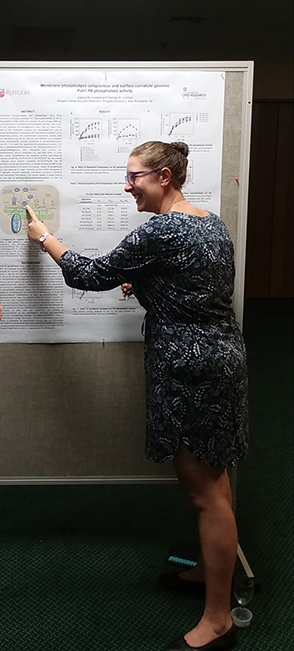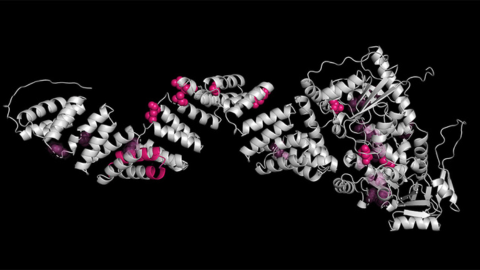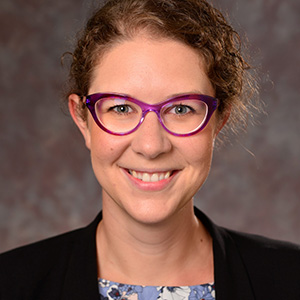
Yes, I have an accent — just like you
My Ph.D. journey took me from my home in Poland all the way to Australia, where I applied microscopy techniques at the University of New South Wales to study the lipid composition of plasma membranes. Since my native language is Polish, I had to learn many scientific terms in English.

One of the techniques I used in my research was called “fluorescence cross-correlation microscopy,” which I used to track lipid–protein interactions in membranes. At first, I struggled to pronounce the name correctly, so I practiced out loud and asked my lab mates for feedback. After a month of diligent practice, I finally felt confident enough to present at a conference. My talk went very well — I didn’t make a single mistake pronouncing “fluorescence cross-correlation microscopy.”
Years later, I took the American Society for Biochemistry and Molecular Biology’s Art of Science Communication course. I still worried that people might struggle to understand my accent. However, the course was full of international students. I realized that everyone has an accent, and it doesn’t matter how we sound; what truly matters is the story we want to share. This shift in perspective inspired me to become a co-facilitator for the ASC course.
I tell ASC students about my struggles with pronouncing “fluorescence cross-correlation microscopy.” I also share my public speaking strategies, which include using a smile and open body language, slowing down when I feel stressed, pausing before trying to pronounce challenging vocabulary and rehearsing presentations so I’ll be able to deliver a smooth and engaging story. I show students that if I could overcome these challenges, they can too.
Translating analogies
As an ASC co-facilitator, I observed that I needed to use analogies and idioms that resonate with my audience to effectively communicate science. When I tried to translate these from my native language to English, however, the translations didn’t always make sense; for example, a direct translation of “szare komórki” is gray cells, but the term refers to grey matter. This challenge gave me the idea to create resources specifically dedicated to non-native English speakers.
Together, ASC course students and the ASBMB Science Outreach and Communication Committee compiled lists of useful English analogies and idioms, which have since become a key part of our classes. On the list are phrases such as “your genome is like a recipe book” (with the ingredients being RNAs and proteins), “factory reset phone” (a brain relearning things that have been forgotten) and “hit a home run” (a stunning success).
Being a foreign science communicator, despite the challenges, also brings the perspective of a different culture, which can intrigue the audience and help build dialogue. I have experienced this during social events at conferences, mentoring students and in casual conversations with audiences interested in science.
English is the global language of modern science, but I like to say there is no single way to speak English. We all learn the language differently, influenced by our environments, textbooks and the accents we hear. Having an accent is something to be proud of. And yes, I have an accent — just like you.
Enjoy reading ASBMB Today?
Become a member to receive the print edition four times a year and the digital edition monthly.
Learn moreFeatured jobs
from the ASBMB career center
Get the latest from ASBMB Today
Enter your email address, and we’ll send you a weekly email with recent articles, interviews and more.
Latest in Careers
Careers highlights or most popular articles

Upcoming opportunities
Friendly reminder: May 12 is the early registration and oral abstract deadline for ASBMB's meeting on O-GlcNAcylation in health and disease.

Sketching, scribbling and scicomm
Graduate student Ari Paiz describes how her love of science and art blend to make her an effective science communicator.

Embrace your neurodivergence and flourish in college
This guide offers practical advice on setting yourself up for success — learn how to leverage campus resources, work with professors and embrace your strengths.

Upcoming opportunities
Apply for the ASBMB Interactive Mentoring Activities for Grantsmanship Enhancement grant writing workshop by April 15.

Quieting the static: Building inclusive STEM classrooms
Christin Monroe, an assistant professor of chemistry at Landmark College, offers practical tips to help educators make their classrooms more accessible to neurodivergent scientists.

Unraveling oncogenesis: What makes cancer tick?
Learn about the ASBMB 2025 symposium on oncogenic hubs: chromatin regulatory and transcriptional complexes in cancer.

